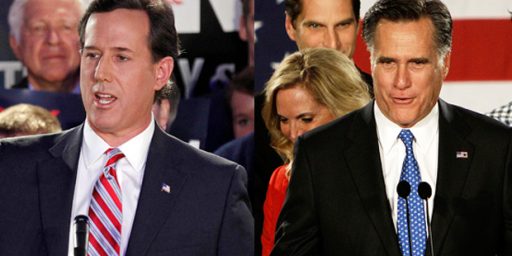Rick Santorum the Irrelevant Candidate
Rick Santorum's good day in Iowa doesn't change the truth about his campaign.
A few years ago when I had my own weblog I wrote about the Iowa Caucus and the mechanism that is used there. I noted that it looks a lot like a Borda Count. The Borda Count voting method, in its simplest form, is where each voter ranks his choices and points are assigned to each candidate based on the total number of candidates on the ballot. For example, if there are 5 candidates the top ranked candidate for each voter would get 5 points, the second ranked 4, and so on down to the last who gets 1 point. Each candidate’s points are tallied and the candidate with the most points wins. The thing is that it is quite possible that the candidate who would win in a majority rule voting scheme can come in second or even third depending on how voters rank them.
The “problem” with the Borda count is that it violates the assumption of Independence of Irrelevant Alternatives (or candidates). What this means is suppose that voters have a choice of 5 candidates, for simplicity call them A, B, C, D, and E. Suppose some voters change their rankings of D and E this change could result in B winning instead of C even though the voters who changed their rankings preferred C over B. In other words, the Borda Count produces a different outcome when re-ranking candidates that don’t have a chance of winning. Thus, with the Iowa Caucus we often see these weird results where a lower ranked candidate in opinion polls suddenly shows up near the top of the results or even winning.
So, does this mean that Santorum has a serious shot at being our next President? Probably not. Because the actual election that determines who will be President is a majority rule election. Santorum was not the first choice among many Republicans so it is doubtful that he’ll do well in a general election against Obama. For example, many voters in Iowa prefer Ron Paul over Santorum, chances are those voters will prefer Obama over Santorum.
What the Iowa Caucus does do is keep Santorum’s campaign alive for a bit longer and he might have a some shot at ending up on a ticket, maybe. However, it strikes me as highly unlikely that he’ll end up as the nominee for the Republican party. And while you might be tempted to think that majority voting is better than a Borda count think again. Majority voting also has its issues as well.






Some interesting economic/ game theory terminology. Some of the polls have asked about second choices and the few I’ve seen show that even among those who prefer a non-Romney candidate,* Romney does well as a second choice. I don’t that this question is asked a lot in the polls to make larger comparisons over time, but _if_ Romney is a lot of people’s second choice, this process may not be as extended as the anti-Romney story line would suggest.
*Paul appears to be an outlier; very infrequently someone’s second choice and his supporters are more likely undecided on a second choice from what I’ve seen.
I was happy when O’Donnell and Angle got the nod to run…..
I was happy when Bachmann won Ames and Palin was doin’ her road tour
In that same light, I’ll be equally happy if somehow, Santorum is given the nod to run against Obama…..we saw some bats&#t crazy in ’08, but people had a real short memory in `10…..I say repetition is good for reinforcement…..put that crazy back on stage…..cuz, really……the national electorate really needs to come to grips with the current state of this party….
I can see how IIA fits in this context (in the sense that for all values of “Not Romney,” the specific value of “Not Romney” is largely interchangeable save for Paul – Perry as the red bus, Gingrich as the blue bus, Santorum as the brown bus, etc.), but not the Borda count – since the balloting was single-vote, there was no ranking going on beyond voters ranking candidates #1. And what seems to have happened is that many of the Not Romney voters collectively (through signals like the late polls) determined Santorum was the best situated Not Romney and flocked to him, allowing him a near-plurality as opposed to all the Not Romneys coming in at 12-14%ish each.
Having said all that, if the true purpose of the caucus is to have a beauty contest, or to select a nominee that is tolerable to the most voters, surely a more appropriate voting technique would be something like approval or limited voting rather than one person, one vote.
@Chris Lawrence: I think one factor here is that Iowa voters know that their caucus does not decide the candidate, its simply the first in a sequence of voting dramas, which at most winnows the field to three or four candidates. That would appear to create some of the same strategic voting issues as a multiple vote ballot
Proposed experiment: Take aside Caucus goers and ask them to rank sequentially the candidates in the order the voter predicts the candidates will rank in the final voting. (A through F) Tell them they will win a prize if they are correct.
Then ask them to rank their personal order of preference.
And then ask them to rank who they are voting for.
I would predict that more voters whose first preference is A and second preference is C or D, will vote for their second preference because of the perceived value of the outcome is more important for the third or fourth place finisher. There are probably similar dynamics on the bottom end, someone whose first preference is F and second preference is C or D.
What would be the consequence of such strategic voting?
It would mean the Romney camp made a tactical error in communicating that they were going to win this thing. Not simply about managing expectations, but in communicating information to the voters that helped them rank Romney as A and discount the value of voting for him against their second choice.
It would appear to explain some of the late surges in the last few IA caucuses, caused by voters adjusting their expectations based upon changing expectations of who A through F are.
To the extent, a candidate like Santorum benefited from strategic voters trying to ensure he was in the top three or four candidates, his support may not be as significant as it appears.
Chris,
It puts me in the mind of the Borda count in that a voter has to rank his preferences to at least some extent. It isn’t strictly like the Borda count in that points aren’t assigned and then tallied. Beyond that it is an odd voting mechanism.
Seems like the bigger factor here is that people willing to come to a polling place at a specific time and be there for a couple hours are, for better or worse, not representative of the electorate in November.